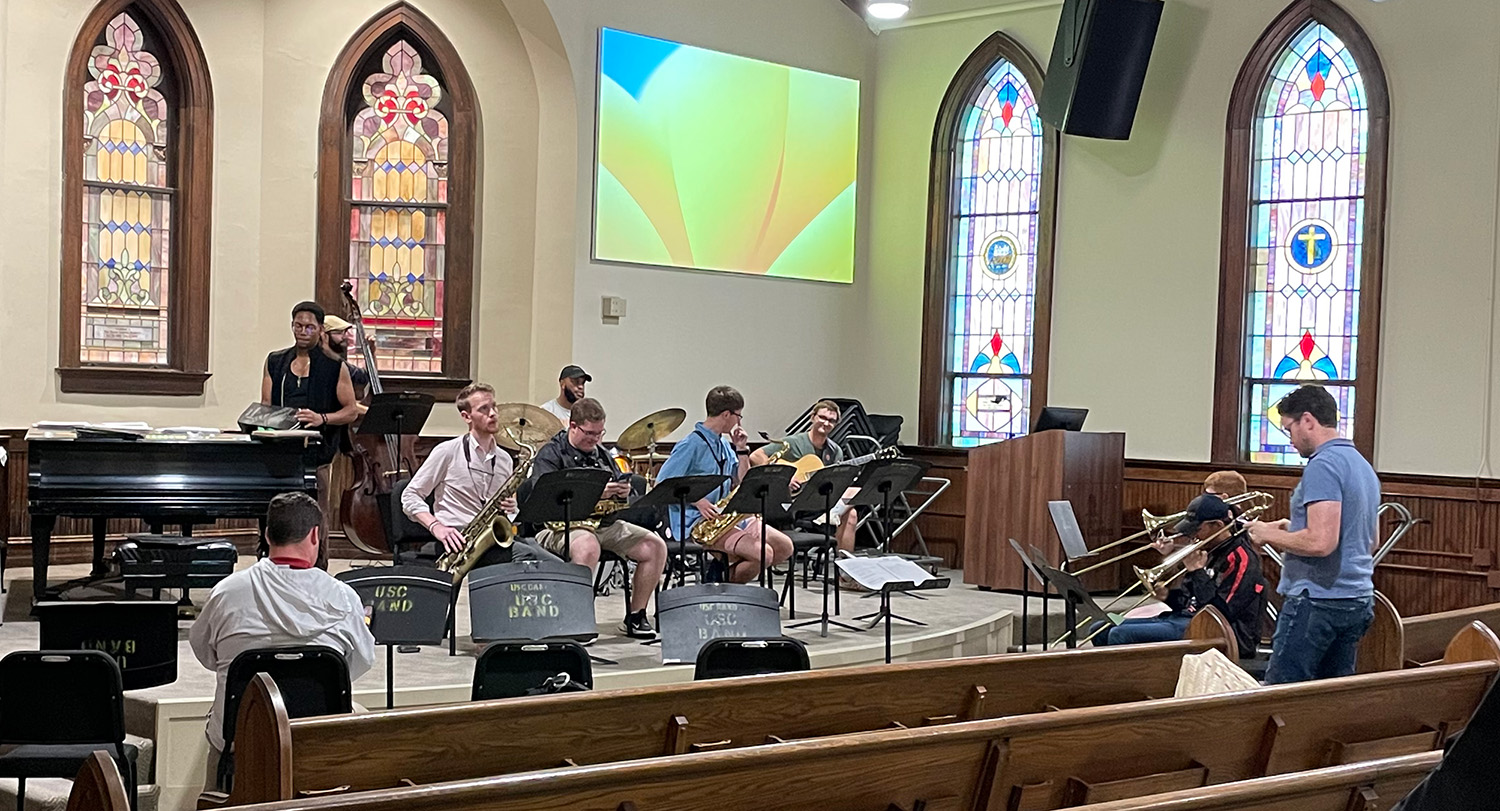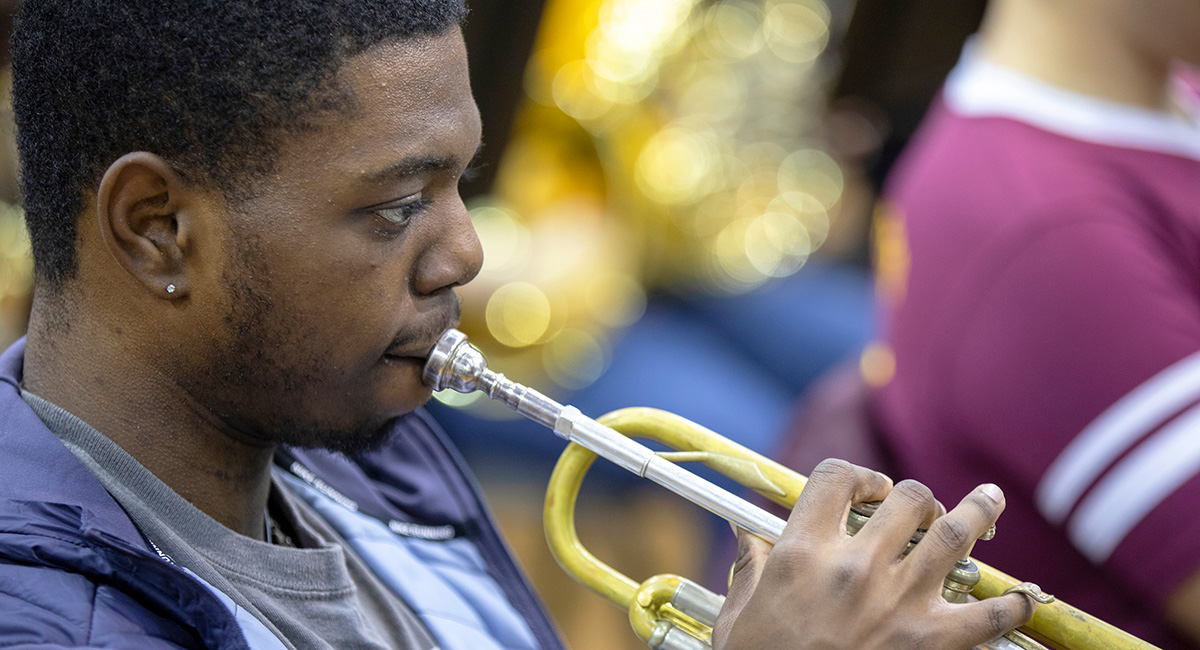
Investments in jazz program reverberate in momentum, reputation
New resources, opportunities have brought spirited growth worth celebrating
“One positive thought produces millions of positive vibrations.” — jazz saxophonist
and composer John Coltrane
The University of South Carolina’s jazz studies program is reaping the positive vibes of a revitalized, growing program envisioned by School of Music Dean Tayloe Harding.
For more than a decade, Harding aspired to add resources to bolster the program as well as the jazz scene in the state. Over the past four years, that vision has become reality with a new dedicated space, new jazz faculty, community outreach initiatives and exciting opportunities.
“The vision has just taken flight,” Harding says. “It’s built a community for the jazz studies students and faculty, and it’s generated an identity for USC jazz that’s not only local and statewide but national and soon to be international when they perform at the Umbria Jazz Festival in Italy and the Jazz à Vienne near Lyon, France next summer.”
To commemorate its centennial year, the School of Music is showcasing its programs, alumni, students and faculty in a special series of stories and performances throughout the coming year. Visit the School of Music Centennial Celebration page for more on the yearlong celebration themed “Sing Thy High Praise: 100 Years of Music at Carolina.”
Growing community
In fall 2023, the jazz program relocated to Greene Street United Methodist Church. The School of Music partnered with the University Educational Foundation to purchase the church property on the corner of Greene and Assembly Streets in 2020. Through a lease agreement, the jazz studies program uses the church buildings for practice space and offices, and the church congregation will continue to worship in the sanctuary.
A first phase of renovations, funded by $2.5 million in university institutional capital improvement funds, preserved the building structures and added faculty offices, studios and rehearsal and classroom space. Fundraising is under way for a future phase that will include more student practice space and a café/jazz club in partnership with USC’s College of Hospitality, Retail and Sports Management. Future plans include updating the sanctuary’s lighting and sound for performances.
“One of the things inherent in our music is spending time with other musicians, not only playing music and practicing together but also talking about music and having those human interactions,” says professor Matthew White, chair of jazz studies. “Greene Street creates a communal space for our students. They’re always hanging out here and playing together.”
The standalone space is unique for jazz programs in the U.S., White says. Along with the multimillion-dollar investment USC is making in jazz studies, it is a great recruiting tool for students.
“To be honest, it's just cool,” he says. “The jazz band rehearses in the sanctuary, and in the afternoon, it’s really beautiful in there with the stained-glass windows.”
When White (trumpet), professor Colleen Clark (drumset) and instructor Lauren Meccia (saxophone) were hired in 2021, the jazz studies major had fewer than 10 undergraduate students and no graduate students. This year those numbers have grown to 30 undergraduate jazz majors and six graduate students. In addition, students in other majors participate in jazz ensembles.
The investment in the program as well as the accomplished faculty are among the reasons alumnus and drummer Malik Pratt (’24 master’s, music performance with a concentration in jazz) made the decision to attend USC’s School of Music for his graduate degree. Now a professor at Western Carolina University, Pratt says the move to Greene Street was a game changer. Not only did he no longer have to carry instruments back and forth across Assembly Street, but the resources and faculty were in one location dedicated to his major.
(Greene Street Methodist Church) is just cool. The jazz band rehearses in the sanctuary, and in the afternoon, it’s really beautiful in there with the stained-glass windows.
“The faculty are a huge resource. They're always continuing their education by educating others.” Pratt says. “My advice for students is to be interested enough to keep asking questions. I didn't have to go far if we ever had a problem with the music that we had trouble figuring out. I could walk less than a couple feet to Dr. Clark's office, and she'd come in and help us — even on days she might have been busy with something else.”
The faculty also was a draw for Ellakyn Brinkley, a junior music education major from Aiken, South Carolina. Brinkley says her interest in jazz derives from the diversity of the origin of jazz and its most notable players. She adds that as a percussionist, playing in the Swing Shift ensemble helped her become a more well-rounded performer.
“The jazz studies faculty are successful artists, and they choose daily to spend their time bringing up and inspiring a new generation of musicians,” she says.
Growing reputation
Among the goals for investing in the jazz program is to raise the profile and reputation of the program, including the Left Bank Big Band, the school’s premier jazz ensemble. In centennial form, the ensemble's performances in 2024-25 include three in prestigious events: the Savannah Jazz Festival in September and both the Umbria Jazz Festival in Italy and the Jazz à Vienne in France in July 2025.
Opportunities such as these were part of White’s vision when he became chair of jazz studies.
“We started recording the ensemble regularly to build a repertoire to submit to festivals,” White says. “Being selected was the payoff to show them why I sometimes really get on them when we’re recording. This is why we work and really pay attention to the details.”
White and Clark were able to arrange for Left Bank to perform with Grammy Award-winning vocalist Nicole Zuraitis and land a premier time and location in Savannah: 6:40 p.m. Sept. 20 in Forsyth Park.
The festivals, particularly Umbria and Jazz à Vienne, will give the students incomparable experiences not only performing themselves but also to see other musicians. In addition, these opportunities help raise the level of musicianship of the ensemble as competition increases in auditions.
Speak Easy, a "Roaring Twenties"-themed dinner concert, is planned at Prohibition, 1556 Main St. in Columbia, in October to raise money and support for the European tour. The Left Bank Big Band will perform music of the era and back saxophonist and vocalist Meccia. In addition to fundraising, White says the concert will give students an opportunity to perform and interact with the local community. Buy tickets or donate online.
Growing outreach
Community building, outreach and engagement are central to the mission and the vision of the School of Music. These efforts are a distinguishing characteristic of the school nationally, as recognized by the National Association of Schools of Music among its 642 member institutions.
Among them are Jazz Girls Day, a program developed and coordinated by Clark, and a revival of the annual USC Jazz Festival.
Clark started Jazz Girls Day — a free daylong program — in 2022 with a goal to grow the number of girls in jazz and inspire more music teachers to launch jazz programs in public schools. A week before the first event, zero participants had signed up and Clark considered canceling, but after some publicity efforts, 14 girls attended.
Since then more than 75 students have participated in South Carolina. The program is offered in three regions in the state — the Midlands, the Lowcountry and the Upstate — and is expanding nationally. With the help of the university and Harding, the name was trademarked by the U.S. government this past spring.
“Jazz is a male-dominated art form, but it’s changing,” says Clark. “I had colleagues from across the country ask how they could get a Jazz Girls Day in their community. That prompted my goal to organize a Jazz Girls Day in all 50 states by 2030.”
Jazz Girls Day events have been held in Ohio, Missouri and Connecticut, with upcoming sessions scheduled for Connecticut, Iowa, Massachusetts, Wisconsin, California, Arizona and Idaho. They’re in the works for Georgia, North Carolina and Nevada as well. With the sessions in South Carolina and other states, more than 250 girls have participated so far.
An event includes breakout sessions for instrumentalists, vocalists and band directors; a focus on women in jazz led by Clark; and a concluding performance in which they play the Jazz Girls Day theme song.
“Jazz Girls Day creates a safe and fun environment to be yourself,” Clark says. “It opens up possibilities for not only for the sounds that you can create, but also the friends you can make and way that you can express your feelings.”
Brinkley says she decided to attend USC because of three people: Clark, Scott Herring and Cormac Cannon.
“From clinics and lessons — and Jazz Girls Day — I could see their love for music matched mine, and that like me, they value positive interactions with music for everyone,” she says. If you’re someone who identifies as a woman and you’re interested in playing jazz, then do it. There are plenty of women already thriving in the jazz industry we can look up to, including our very own Dr. Clark.”
Upcoming dates for Jazz Girls Day in South Carolina are: Jan. 18, Columbia; April 26, Lowcountry; and May 3, Upstate.

In February, the School of Music will host the Essentially Ellington Regional, featuring guest artist Rodney Whitaker. This free program provides a learning, adjudication and performance opportunity for regional high school and middle school students to perform for and work with jazz faculty.
“The Essentially Ellington Regional is something we've been working toward for a while building on the success of our revived jazz adjudication festival,” White says. “We are the only regional event in the state and one of only three in our region.”
Essentially Ellington festivals are presented in partnership with Jazz at Lincoln Center, which will provide free of charge two additional clinicians to participating bands in the USC festival on Feb. 20 and access to the entire Ellington music library.
“This aligns with our mission to elevate access to jazz and jazz education in our state through interacting with these guests and young people having access to music of one of America's greatest composers,” White says. “This is a huge honor for our program and a huge win for jazz education in South Carolina.”
Growing jazz education in SC
As the flagship university, USC has a responsibility to raise the level of jazz education engagement in the state, according to White.
“That is really important to me, not only for the preservation of the art form but also, selfishly, to develop more musicians and a bigger pool of students who can attend the university and study jazz,” he says.
When White, Clark and Meccia were hired in 2021, a survey showed that that only about 10 percent of public schools in South Carolina had any kind of jazz program. With their experience in touring, playing and teaching, the three of them set out to share their knowledge through outreach to school band directors and through initiatives such as Jazz Girls Day and the USC Jazz Festival.
Clark estimates they’ve made about 40 outreach visits in their three years at the university: “We’ll visit any band director who asks — free of charge,” she says.
The school’s grass roots efforts to support middle school and high school jazz programs in South Carolina was recently featured in Downbeat, a publication devoted to jazz.
White also sees the program’s outreach efforts to bolster jazz education as a way to lift up South Carolina’s jazz history.
“Think about the Jenkins Orphanage Band in Charleston, Dizzy Gillespie and all the musicians connected to South Carolina. As the flagship university, we are pushing that legacy forward,” he says.